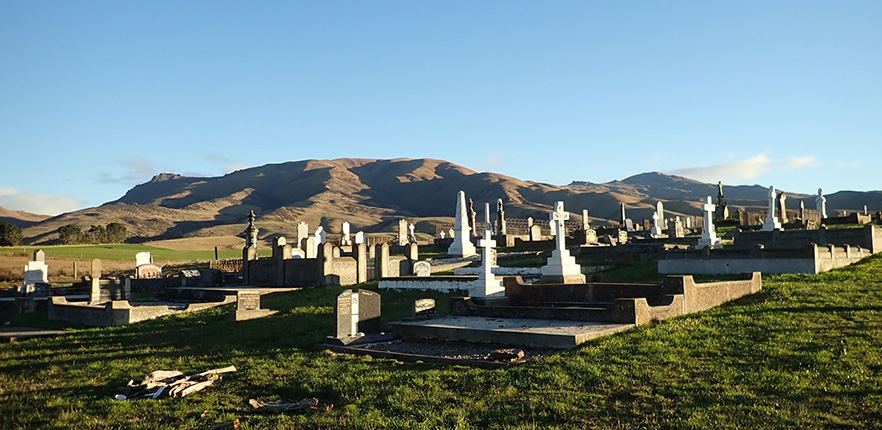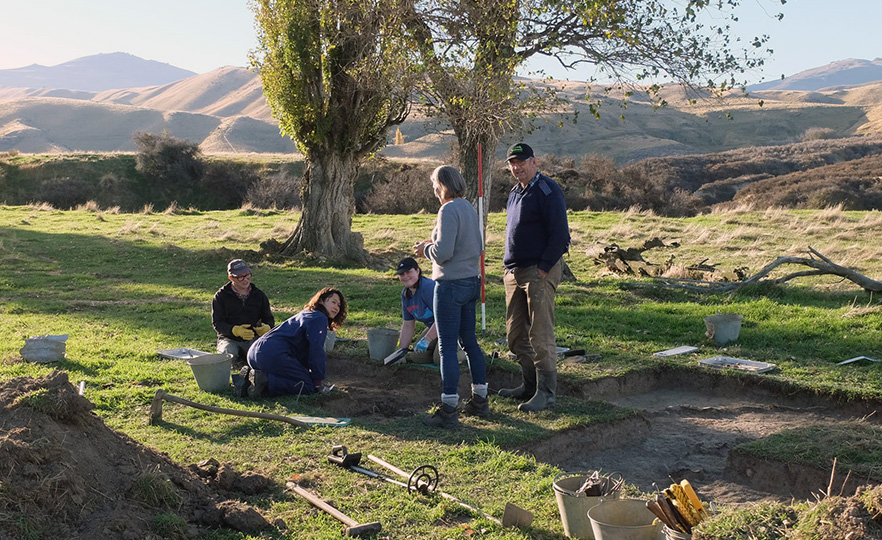
Drybread Cemetery.
The Southern Cemeteries Archaeological Project will soon be complete, when the third and final reburial ceremony takes place at Drybread Cemetery this month.
The public reburial, which will include both Christian and Chinese services, will take place on Saturday, 20 May 2023.
Project co-lead Dr Peter Petchey, Southern Archaeology Director, says Drybread was a goldrush-era settlement in the Maniototo which was initially set up in 1863 as a temporary diggers' camp.
The cemetery is still in use by the local rural community, but many of the original records have been lost and there was ongoing uncertainty about unknown burials.
The Drybread Cemetery Trust approached the Project team to help locate the lost graves and work was carried out between 2020 and 2022.
The remains of twelve people, ranging in age from infants to adults, were excavated, five of whom were of Chinese descent. A sixth Chinese grave had been historically exhumed.
Project co-lead Professor Hallie Buckley, of the University of Otago's Department of Anatomy, says immigrant settlers travelled to New Zealand for the promise of a better life.
“Our aim throughout the project has been to create a detailed picture of what life was like in the late 1800s.
“At Drybread, the range of apparent wealth – from extreme poverty to some possible affluence – suggest some individuals continued to struggle, particularly several of the Chinese miners,” she says.

The Southern Cemeteries Archaeological Project team work on excavations at Drybread Cemetery.
The Southern Cemeteries Archaeological Project started in 2016 at St John's Cemetery in Milton, continued in 2018 at Lawrence's Ardrossan Street and Gabriel Street cemeteries, and moved to Drybread in 2020.
The Project applied a biocultural approach, combining biological and cultural information, to examine the health, wellbeing, and society, of early settlers in the Otago region.
In total, the Project uncovered the remains of 73 unknown early settlers – 27 in Milton, 34 in Lawrence, and the 12 in Drybread. The project has also studied some of the places where these people lived and worked, particularly at Drybread where a mining family's house and garden site was investigated.
“Working on this project has been a truly rewarding experience. Not only have we learnt more about the lives of early settlers in New Zealand, but we have been able to provide dignity to those buried in unmarked, and forgotten graves” Professor Buckley says.
Bioarchaeological analyses are still ongoing of the Drybread portion of the project and will culminate in a monograph detailing the archaeological and osteological findings of the Drybread people and the community in which they lived.
Event details
The final reburial ceremony will take place at Drybread Cemetery, Glassford Road, at 1pm on Saturday, 20 May 2023.
For more information, contact:
Ellie Rowley
Communications Adviser
University of Otago
Mob +64 21 278 8200
Email ellie.rowley@otago.ac.nz